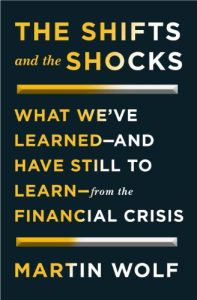Join getAbstract to access the summary!

Join getAbstract to access the summary!
Martin Wolf
The Shifts and the Shocks
What We’ve Learned – and Have Still to Learn – from the Financial Crisis
Penguin, 2014
What's inside?
Financial Times economics expert shows why the financial system needs radical change.
Recommendation
This is a radical treatise from Martin Wolf, the chief economics commentator and associate editor of The Financial Times. He argues persuasively that policy makers should force banks to hold more equity, embracing the possibility that the financial sector could shrink drastically as a result. His agenda includes other widely discussed ideas, such as changing the US dollar’s global role and encouraging developing countries to insure themselves against fiscal crisis. While always politically neutral, getAbstract suggests Wolf’s clear language and intriguing arguments to financial professionals, investors and executives.
Summary
About the Author
Associate editor and chief economics commentator at The Financial Times, Martin Wolf has received many awards for journalism. His previous books include Why Globalization Works and Fixing Finance.





















Comment on this summary